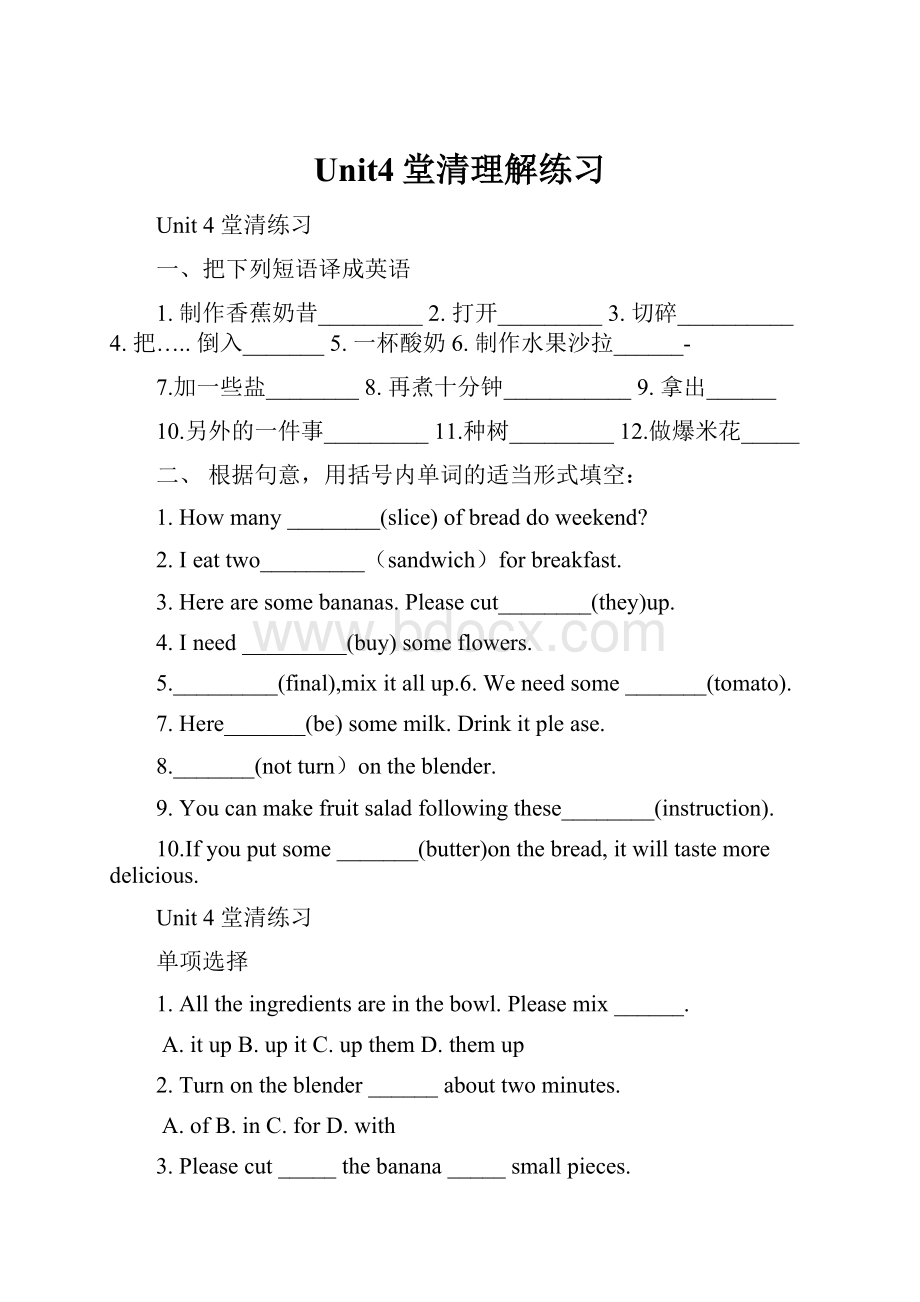 Unit4堂清理解练习.docx
Unit4堂清理解练习.docx
- 文档编号:10461525
- 上传时间:2023-02-13
- 格式:DOCX
- 页数:18
- 大小:27.50KB
Unit4堂清理解练习.docx
《Unit4堂清理解练习.docx》由会员分享,可在线阅读,更多相关《Unit4堂清理解练习.docx(18页珍藏版)》请在冰豆网上搜索。

Unit4堂清理解练习
Unit4堂清练习
一、把下列短语译成英语
1.制作香蕉奶昔_________2.打开_________3.切碎__________4.把…..倒入_______5.一杯酸奶6.制作水果沙拉______-
7.加一些盐________8.再煮十分钟___________9.拿出______
10.另外的一件事_________11.种树_________12.做爆米花_____
二、根据句意,用括号内单词的适当形式填空:
1.Howmany________(slice)ofbreaddoweekend?
2.I eat two_________(sandwich)forbreakfast.
3.Herearesomebananas.Pleasecut________(they)up.
4.Ineed_________(buy)someflowers.
5._________(final),mixitallup.6.Weneedsome_______(tomato).
7.Here_______(be)some milk.Drinkitplease.
8._______(notturn)ontheblender.
9.Youcanmake fruit saladfollowingthese________(instruction).
10.Ifyouputsome_______(butter)onthebread,itwilltastemoredelicious.
Unit4堂清练习
单项选择
1.Alltheingredientsareinthebowl.Pleasemix______.
A.itupB.upitC.upthemD.themup
2.Turnontheblender______abouttwominutes.
A.ofB.inC.forD.with
3.Pleasecut_____thebanana_____smallpieces.
A.up,toB.up,intoC.off,toD.off,into
4.Pleaseturn___thelightwhenyouleavetheroom.
A.offB.onC.upD.down
5.________cupsofcoffeedoweneed?
A.HowB.HowmuchC.HowmanyD.Howmanyof
6.—______breadwouldyoulike?
—Threepiecesof________.
A.Howmany,breadsB.Howmany,bread
C.Howmuch,breadsD.Howmuch,bread
7.Willyouadd________tothesalad?
A.manyhoneysB.muchhoneysC.morehoneyD.manymorehoney
8.Putsome____andchicken____onthesandwich.
A.lettuce,sliceB.lettuces,slicesC.lettuce,slicesD.lettuces,slice
9.__mixthesethingstogether.A.NotB.NoC.Don’tD.Youaren’t
Unit4堂清练习
译成英语
乘火车去上学在太空站坐火箭去月球
反复地帮忙做家务感到无聊寻找
许多,大量不赞成某人的意见跌倒
词汇运用
1.Canyou_______(混合)itallup?
2.Wouldyouliketo_______(倾倒)somemilkintotheglass?
3._________(最后),putanotherpieceofbreadonthetop.
4.The____________(温度)inthisroomis26℃.
5.In__________(秋天),leavesfalldownfromtrees.
6.Itoldthose___________(travel)thewaytothenearesthotel.
7._________(add)thesalttothenoodles,please.
8.Mid—autumnDayisa__________(tradition)festivalinChina.
9.Doyoulikelettucein_________(sandwich)?
10.Theyare____________(celebrate)ThanksgivingDaynow.
Unit4堂清练习
句型转换
1.Therearetwocupsofteaonthetable.(提问)
___________________cupsofteaarethereonthetable?
2.Heneedsyogurt.(改为否定句)He______________yogurt.
3.Weneedoneteaspoonofbutter.(对画线部分提问)
______________butterdoyouneed?
4.Pleaseusetheknifetocutuptheapple.(改为同义句)
Please______________theapplewiththeknife.
5.Givemeyouranswers,please.(改为否定句)
____________meyouranswers,please.
完成句子
1.请放些鸡肉片在这个三明治上。
Pleaseputsomechicken______________thesandwich.
2.牛奶对健康有好处,我们应多喝牛奶。
Milk________good________health.Weshoulddrinkmoremilk.
3.他用一块布把他的桌子盖上了。
He__________histable________acloth.
4.这儿有制作火鸡的方法。
______________awaytomaketurkey.
5.请给我一杯加蜂蜜的热茶。
Pleasegivemeacupofhottea________.
6.打开搅拌机,搅拌两分钟。
__________theblenderfortwominutes.
7.不要忘了在汤里加些盐。
Don’tforgetto_________some______tothesoup.
中考体验
1.——ShallwehangoutinGreatBazzar(大巴扎)tomorrow?
——I’mafraidnot.______thefinalgameoftheworldCuponTV.
A.ThereisB.TherewillbeC.TherewillhaveD.Thereis
goingtohave
2.Theweatherforecastsaysthat_____anotherstormtomorrow.
A.therewillhaveB.therewillbeC.therehasD.therehasbeen
3.——Listen!
There_____someone_______atthedoor.
——Itmustbeyoursister.
A.is,knockingB.is,knockC.are,knockingD.are,knock
4.Davereallylikesdriving.Ithinkbeinga____isjustrightforhim.
A.doctorB.teacherC.farmerD.driver
5.Ipaid¥10for_______thismorning.
A.4bottlemilksB.4bottlesofmilk
C.4bottlesofmilksD.4milk
2. have 与must
(1) 含义和用法上的区别:
have to 强调客观上需要做某事,即表示外界条件的需要不得不做某事,含有 “形势逼迫”的意味;must 强调说话者主观上认为必须做某事,含有“主观判 断”的意味, 例如:
My bike was broken on my way to school. I had to walk there.我的自行车在上学的路上坏了,我不得不走路去上学。
We must learn English well. 我们必须学好英语。
(2) 否定式的区别:
have to 的否定式意为“不必”,must的否定式意为“禁止;不允许”。
因此, 以must开头的一般疑问句的肯定回答为“Yes, 主语+must”,否定回答为“No, 主语+needn't / don't have to”。
例如:
Must I finish the homework now?
我必须现在完成作业吗?
---Yes, you must. 是的,你必须现在完成。
(三). maybe和 may be
maybe是副词,意思是“也许、可能”,在句中作状语,相当于perhaps,常位于句 首。
may be中,may是情态动词,be是动词原形,两者构成完整的谓语形式,与主语 形成系表结构,意为“也许是、可能是" (四). too much和much too 区别
(1). too much “太多”用作形容词,后接不可数名词. too many后接可数名词复数。
(2) much too "太”是副词。
后接形容词或副词too much当中的too是副词,修饰much. much too 当中的much是修饰too的, 用来加强too的语气
10. invte sb to do sth 邀请某人做某事
11.some more 更多一些
12.go to a guitar lesson / have a guitar lesson / take a guitar lesson上吉他课
14.say sth to sb 对某人说
15. have tennis training 进行网球训练
16.16. be free
17.soccer practice足球练习
18. go to the mall 去商场
19.write soon快回信
20.go to the movies with some friends和朋友看电影
21.call sb;give a call to sb 给某人打电话
22.the key to the door门上的钥匙
23.science report科学报告
24.thanks a lot多谢
25. too much homework太多家庭作业
26. all my life我的一生
27. on Saturday在周六
28.go to the concert 去听音乐会
29.the day after tomorrow后天
30. keep quiet 保持安静
31. babysit his sister照看他的妹妹
32. come over顺便来访
33. the whole day整天
34.
35.would like/love to do sth 想做某事
36.this evening 今天晚上
37. would like sb to do sth想要某人做某事
Unit6Ifyougototheparty,you’llhaveagreattime!
一.重点单词
1.organizev.组织--n.organization组织,机构--adj.organized有组织的
2.againstprep.反对--opposite. for
3.advice 为不可数名词,可用some,much,alittle,apieceof等修饰,但不可说an advice 或alotof advices.
advisev.劝告,建议
4.travelv.&n.旅游,旅行,游历--travelern.游客,游人
5.normaladj.正常的,一般的;normallyadv.正常地;通常地,一般地;
6.unlessconj.除非,如果不,=ifnot
7.certainlyadv.无疑,肯定,当然,行=ofcourse/sure
8.carefuladj.小心的,细致的,精心的,慎重的;carefullyadv.小心地,认真地
9.carelessadj.粗心的,不小心的carelessnessn.粗心,大意
10.experiencen.经验(不可数)经历(可数)an~
SectionA
重点词组:
1.haveagreattime玩得高兴=haveagoodtime/enjoyoneself/havefun
2.wearjeanstotheparty穿牛仔裤参加聚会
3.takethebus乘公共汽车=bybus
4.onfoot步行
5.
3.chancen.机会;机遇4.tonightn.今晚,今夜
5.windown.窗;窗户6.explainv.解释;说明
7.improvev.提高;改进
二.重点词组
1.Ifyougototheparty,youwillhaveagoodtime.(if引导的条件状语从句,时态是“主将从现”)
2.gototheparty去参加聚会
3.haveagreat/goodtime==enjoyoneself玩得高兴,过得愉快4.letsbin让某人进入
5.takeaway拿走
6.allthetime=always总是,一直
7.makealiving谋生
8.inorderto…为了…
9.studyfor…test为…考试而学习
10.stayathome呆在家里
11.Let’shave/makeit…让我们约定在…
12.halftheclass一半的学生
13.end-of-yearparty年终晚会
14.gotocollege上大学
15.travelaroundtheworld环游世界
16.makealotofmoney赚很多钱
17.getaneducation受教育
18.infact事实上
19.aprofessionalsoccerplayer一名职业足球运动员
20.playsportsforaliving以运动为谋生
21.getinjured受伤
22.befamousfor…因…而出名
23.toomuch+不可数名词/toomany+可数名词复数太多的…
24.muchtoo+形/副词实在太…
25.somuch+不可数名词/somany+可数名词复数如此多…
三.重点句子
1.IthinkI’llridemybike.Ifyoudo,you’llbelate.
2.IthinkI’mgoingtostayathome.Ifyoudo,you’llbesorry.
四.重点语法:
由if引导的条件状语从句
if用做连词时,可以表示“如果;假如”,用来引导一个条件状语从句。
如:
Iwillgoifheasksme.
Ifyoueatbadfood,youmaybeill.
注意:
在主句和条件状语从句中的动词都表示将来的动作时,主句中常用一般将来时,含有
情态动词的句子或祈使句,也可以是谓语含有want,hope,wish等动词的句子,但从句中常
用一般现在时代替将来时。
如:
Wewillcometoseeyouifwehavetime.
Youwon’tbeabletopasstheexamifyoudon’tworkhard.
IhopetovisitherifIamfree.
【典型例题】
用所给动词的适当形式填空。
Idon’tknowifmyuncle____.Ifhe______,Iwillbehappy.(come)
Allofuswillbeexcited___youcancomewithus.
A.while,B.ifC.butD.or
五.知识点讲解
1、IthinkIamgoingtothepartywithKarenandAnn.
分析:
begoingtodosth.将要、打算做某事。
如:
Iamgoingtodosomeshoppingwithmymother.
辨析:
begoingtoandwill.
begoingtoandwill两者都可以表示将来,其区别如下:
begoingto常用于事先经过的打算、计划或意图,也可用于根据某种迹象将要发生的动作。
如:
Whyareyoutakingdownallthepictures?
Iamgoingtorepaintthewall.
Lookatthedarkcloudsinthesky.It’sgoingtorain.
will常用于不受人的主观意愿影响的单纯将来,也可用于条件状语从句中,还可以表趋向或习惯的动作。
如:
TomorrowwillbeTeacher’sDay.
Ifitdoesn’traintomorrow,wewillgotothezoo.
Wewilldiewithoutairorwater.
【典型例题】
Lookatthesedarkclouds.________________.
A.itwillrainB.it’sgoingtorain.
C.itisrainingD.itwillbefine.
2、Halfofclasswon’tcome.
分析:
half,adjandn.一半(的)。
half常用于名词或修饰名词的冠词前面,即halfa/an/the/one’s+n.还可以用于ahalf+n.这中结构。
如:
Pleasecutthecakeintohalves.
Thelittleboydrankhalfabottleofwater.==thelittleboydrankahalfbottleofwater.
HalfofthechildrenarefromChinese.
注意:
half短语作主语时,谓语动词与half后的名词保持一致。
如:
Halfofthekidsaresleepingnow.
classn.全班的学生,属于复数;班、班级,属单数。
类似的集体名词还有:
family,team,nation.如:
Theclasshasselecteditsnewmonitor.
【典型例题】
Halfofhisbooks___ writteninFrench.
A.haveB.hasC.isD.are
3、ifyoudo,theteacherswilltakeitaway.
do在此只上文中出现的“bringfoodtotheparty”。
在英语中,常使用do,does,did,指代上文中再次出现的动作,以免重复;如果是否定,则用相应的don’t,doesn’t,didn’t。
如:
Hedoesn’twanttobuyacomputer,butIdo.
Pleasepassmeyourhomework.Ifyoudon’t,Iwillbehungry.
takeaway,拿走,带走。
注意属于动副的结构。
如:
Thefoodtastesterrible,pleasetakeitaway.
【典型例题】
----Iwonderifitisgoingtorainnextweek
----Ifit___,Ihavetostayathome.
A.isB.doesC.doD.will
4、Don’trunorshoutattheparty.
分析:
orcong.其用法如下:
和,表示并列关系,常用于否定句中,and用于肯定句中。
如:
Ihavenobrotherorsister.
=Ihavenobrotherandsister.
或者,表示选择关系,常用于选择疑问句中或either…..or….结构中。
如:
Ileftiteitheronthe
- 配套讲稿:
如PPT文件的首页显示word图标,表示该PPT已包含配套word讲稿。双击word图标可打开word文档。
- 特殊限制:
部分文档作品中含有的国旗、国徽等图片,仅作为作品整体效果示例展示,禁止商用。设计者仅对作品中独创性部分享有著作权。
- 关 键 词:
- Unit4 理解 练习
 冰豆网所有资源均是用户自行上传分享,仅供网友学习交流,未经上传用户书面授权,请勿作他用。
冰豆网所有资源均是用户自行上传分享,仅供网友学习交流,未经上传用户书面授权,请勿作他用。


 《Java程序设计》考试大纲及样题试行.docx
《Java程序设计》考试大纲及样题试行.docx
